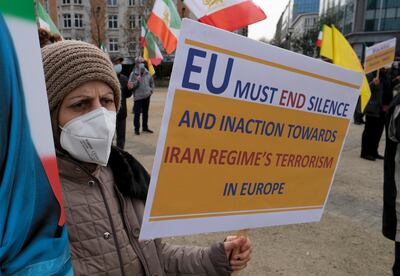This week’s threat by Iranian supreme leader Ayatollah Ali Khamenei that his country might enrich uranium to 60 per cent purity is a dangerous act of brinkmanship that could escalate tensions with the West over its nuclear programme.
Coming just days after senior officials from the International Atomic Energy Agency reached a temporary deal with Tehran to continue monitoring its nuclear activities, Mr Khamenei’s remarks suggest that hard-line elements within the regime have little interest in compromise.
On the contrary, if Iran were to press ahead with enriching uranium to 60 per cent, which is just below the threshold required for producing nuclear warheads, it would effectively end any hopes US President Joe Biden might still entertain of reviving the controversial nuclear deal with Tehran. The Iranian government had already attracted widespread criticism for its decision earlier this year to begin enriching to 20 per cent, a clear violation of the nuclear deal that Iran signed in 2015, to which it would like to return.
When Iran first announced its intention to intensify nuclear enrichment activities, it was widely seen as a tactic to increase pressure on the incoming Biden administration to resume negotiations after former US president Donald Trump withdrew from the deal in 2018.
But now, as a result of its increasingly aggressive stance on the nuclear issue, there must be a very real possibility that Iran’s actions make the resumption of talks impossible. Certainly, the combative language currently emanating from Iran suggests that getting Iranian negotiators to resume talks will not be easy.
Announcing his country’s new enrichment plans, Mr Khamenei repeated his claim that the country would never back down over its nuclear programme. “Iran will not yield to pressure. Our stance will not change,” state-run Iranian television quoted him as saying.
Mr Khamenei’s uncompromising remarks come after the Biden administration indicated that it was prepared to engage in talks with Iran about returning to the 2015 deal.
In what is proving to be a delicate diplomatic manoeuvre to coax Iran back to the negotiating table, the EU has proposed an informal meeting involving the three European signatories to the deal – Britain, France and Germany – as well as the US. Iran has yet to respond to that suggestion.
Attempts to reopen the talks have been in deadlock over the issue of which side makes the first move to get the process going again. Iran has demanded that Washington first removes the punitive economic sanctions imposed by Mr Trump before it agrees to resume talks, while Mr Biden has said he wants Iran to end its violations of the 2015 deal and return to full compliance before negotiations can recommence.
There has also been consternation in Iran about recent comments made by US Secretary of State Antony Blinken, who said earlier this week that Washington wants to extend the terms of the 2015 agreement. Blinken's comments are a response to US critics of the deal, who have long argued that it focused too narrowly on the nuclear enrichment issue and did not cover other aspects of Iran’s programme, such as development of nuclear missiles.

The problem Iran now faces is that, because of recent aggressive comments by Mr Khamenei and his colleagues, even committed supporters of the 2015 deal in both the US and Europe are starting to lose patience with Tehran’s antics, to the extent that some European diplomats are now privately questioning whether the talks can resume at all.
“Rather than trying to lay the groundwork for a resumption of talks, the Iranians seem to be doing their best to frustrate efforts to revive negotiations,” a senior European diplomat involved with the process told me earlier this week.
Certainly, the recent decision by the Majlis, the Iranian Parliament, which is dominated by hard-line supporters of Mr Khamenei, to end roving snap inspections by the IAEA has made the UN’s task of monitoring Iran’s nuclear activities immeasurably more difficult.
Even though Rafael Grossi, the IAEA’s director general, was able to reach a compromise agreement with Iran over future monitoring arrangements after he visited Tehran last weekend, he was forced to concede that, as a result of the decision taken by the Majlis, there will be a 70 per cent reduction in UN inspections of Iranian nuclear activity.
Of even greater concern for European and American officials are the details contained in the IAEA’s latest report on Iran, published this week, which reveals that Iran has acquired 17.6kg of 20 per cent enriched uranium, with its overall stockpile of enriched uranium now standing at 2,967kg – 14 times higher than the limit set under the terms of the 2015 deal.
In addition, the report noted that Iran has succeeded in installing advanced IR-6 centrifuges at its underground Fordow enrichment facility, which is also in violation of the agreement. And it says Tehran has failed to provide technically credible explanations about traces of enriched uranium that UN inspectors found at Iran’s nuclear storage facility at Turquzabad, which Israeli Prime Minister Benjamin Netanyahu has labelled Iran’s “secret atomic warehouse”.
For all the talk about resuming negotiations, the evidence acquired by the IAEA suggests that Iran has little interest in curbing its illicit nuclear activities, to the extent that, if it persists with this behaviour, a diplomatic solution to this crisis no longer remains tenable.
Con Coughlin is a defence and foreign affairs columnist for The National
























